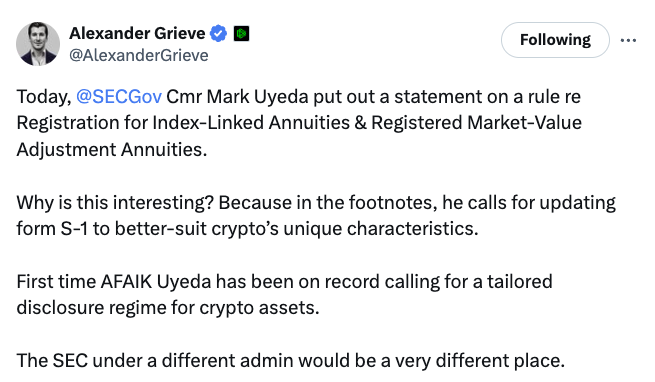SEC Commissioner Mark Uyeda sharply criticized the agency’s approach to crypto regulations and described the general approach to crypto asset applications as problematic. In a statement on the SEC’s official website on July 1, Uyeda announced the adoption of new rules and form changes to implement the Registered Index-Linked Annuities (RILA) Act.
SEC and the Crypto Market
However, the footnotes provide insight into how the Gensler-led institution approaches crypto asset regulation, particularly when it comes to sharing information in Form S-1 applications. In Footnote 3, Udeya called for updates to Form S-1 applications, used by firms when going public or registering new securities, to better reflect the unique nature of crypto assets and described the current approach to crypto applications as problematic:
“Many of these issuers and crypto assets have features that may technically require irrelevant or inapplicable information from Form S-1 but do not require certain information that could be significant.”
Alexander Grieve, head of government affairs at crypto venture capital firm Paradigm, noted in a post on X on July 2 that, to his knowledge, it was the first time Commissioner Udeya called for a special disclosure regime for crypto assets.

Details on the Matter
The Blockchain Association, a US-based crypto advocacy group, also praised Udeya’s comments in a post on X on July 2, stating that his nuanced and innovative approach to crypto is exactly what the industry needs.
Udeya’s statement came just four days after his agency sued Ethereum development firm Consensys on June 28, alleging that its wallet application MetaMask acted as an unregistered broker in the offering and sale of securities.
Additionally, it targeted Ethereum staking services such as Lido DAO and Rocket Pool, platforms used by MetaMask for Ethereum staking. After receiving Wells’ notice from the agency, Consensys sued the SEC in April, challenging potential attempts to classify Ethereum and related staking services as securities.


 Türkçe
Türkçe Español
Español









